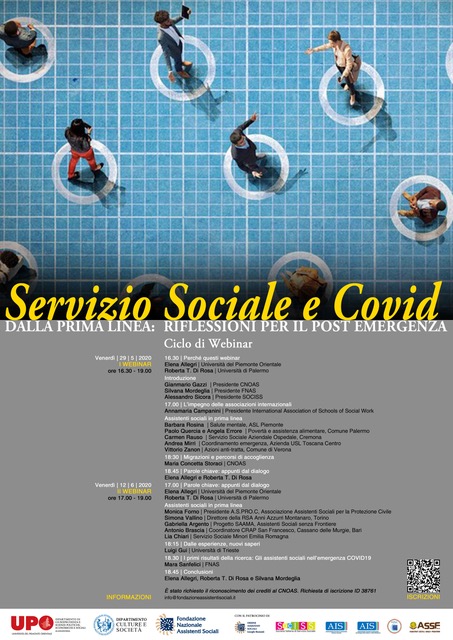Social Work and Covid-19: from the front line, reflections for the post emergency
Prepared by Elena Allegri -Professor of Sociology and Social Work, University of Eastern Piedmont, Alessandria, Italy. Email: elena.allegri@uniupo.it
Roberta T. Di Rosa -Professor of Sociology and Social Work,University of Palermo, Italy. Email: robertateresa.dirosa@unipa.it
Silvana Mordeglia – President of the National Foundation of Social Workers
Email: presidente@fondazioneassistentisociali.it
The present
Due to the Covid-19 pandemic an increasing number of schools of social work and universities around the world are activating online learning. All social work teachers are being asked to commit to working to transform their face-to-face lessons online. This also means giving up exercises, simulations and face to face internship, the direct relationship between students, professors, social workers presenting their experience in the lessons, service users involved in teaching, i.e. the relationship between different actors that is core to the education of future social workers in universities. The transformations that have disrupted people’s lives, from red zones to confinement to physical distancing, are highlighting vulnerabilities and social inequalities. These are also becoming apparent in online learning. There are students, in fact, who do not have useful devices to follow online lessons, others live in areas where the connection band is weak. During the online connection, moreover, it is impossible to look into each other’s eyes. It is difficult to catch the signals of non-verbal communication, gestures are eliminated. Yet, these are some of the reasons that make us feel more tired after lessons, meetings, webinars.
The future
In addition to these difficulties, it is also important to highlight the opportunities that this new situation is showing. Teachers and social workers are acquiring new skills that are very useful to look to the future in a proactive way.
Firstly, building a learning system in social work centered on blended learning methodologies which include classroom learning, online learning and mobile learning. Blended learning could provide an effective solution to holding together the needs of students living away from their university and strengthening of the system of relationships between the different actors involved in the training, as already described.
Moreover, in social work training both the relationship between theories and practices and the connection between teaching and the phenomena present in the social context have always been considered fundamental. The retention of these priorities is a guarantee of quality learning, especially in this period of health and social emergency, where social workers involved in frontline services, hardly visible in the media discourse, are the privileged witnesses, a status achieved through becoming involved.
Webinars
As Professors of Social Work at the University of Eastern Piedmont, Alessandria, and at the University of Palermo, together with the National Foundation of Social Workers, we organized a series of webinars on Social Work and Covid-19, in Italian. Support was given by the National Council of the Order of Social Workers, Italian Society of Social Work, Italian Association of Sociology, Social Workers for Civil Protection, and Social Workers Without Borders.
The intent of the first two webinars is to offer an opportunity for the profession and the discipline of social work to make comparisons with others. This is useful in giving meaning to the ongoing health and social emergency, and to plan the future. University professors and social workers on the front line have been involved in presenting these seminars, as indicated in the poster above.


